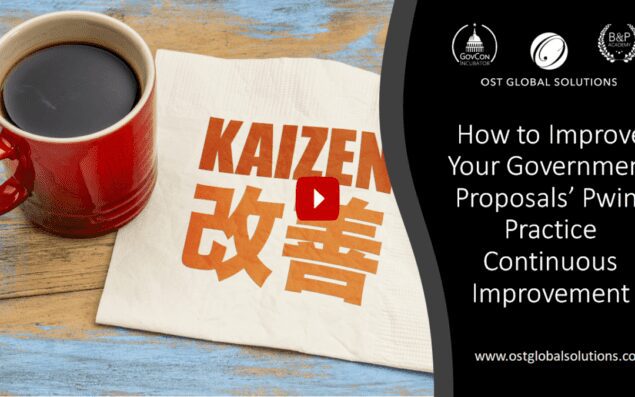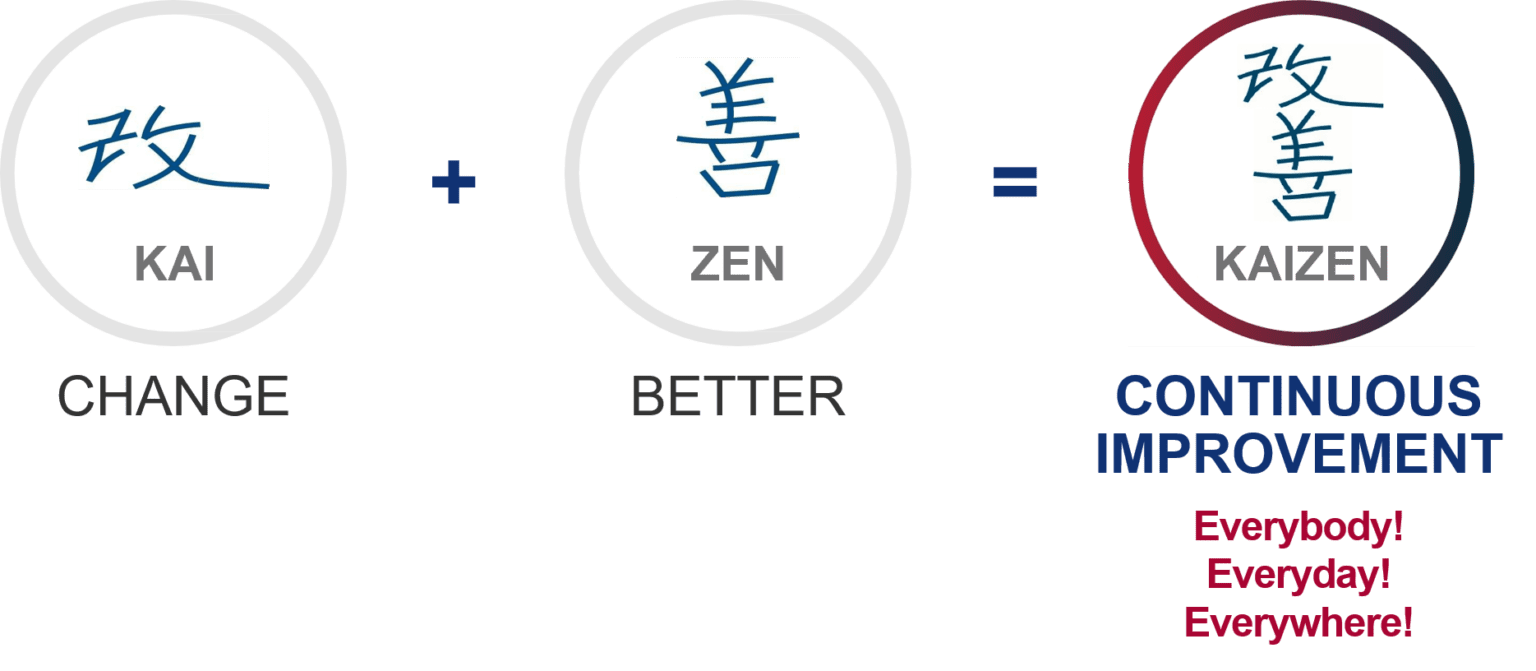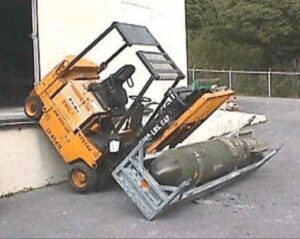In last week’s post, we focused on staying fresh and innovative with our proposal and capture processes. This week, we focused on a set of steps necessary to improve and optimize these processes.
In part four of our Improving Your Government Proposals’ Pwin series, we explore practicing continuous improvement. We covered measuring your proposal quality to improve your win probability (Pwin) in our first article and video. Today you will learn some best practices for gathering your team’s input for that process.
Kaizen is a Japanese word that means improvement, but there is an implied tone of “continuity” or “philosophy” in the word. In industries around the world, kaizen refers to lean business practices, where the goal is to eliminate waste. Waste meaning wasted resources, like time, money, training, etc.
Image Source: Kaizen Institute
Why Does a Lessons Learned Process Improve My Pwin?
Success does not consist of never making mistakes, but in never making the same one a second time. -George Bernard Shaw
Gathering lessons learned following a proposal submission is a major best practice. However, you’ll see that most organizations don’t actually do it. It is a best practice that is commonly not implemented. Why do you think that is?
It could tie back into your organization’s business development culture. Or perhaps management doesn’t realize the important role a lessons learned process plays in increasing your proposals’ win probability for federal contracts. Either way (or maybe it’s something else), this leads to mistakes repeated.
Essentially, you need to:
- Document your lessons learned one or two days after completing the proposal. This will prevent you from forgetting the pain and details of what happened. Then you need to do it again after the customer debrief. We strongly recommend asking the customer for a debrief whether you win or lose the contract. The reasons for this practice could fill another article, so we’ll save it for another day.
- Upload your lessons learned document (together with the debrief) to a common access area. You don’t want your lessons learned to disappear into someone’s personal computer folder. For example, keeping them on a shared drive ensures that everyone involved can review them.
- Review the document prior to starting the next proposal. This is an important step. Gathering the lessons learned will be fruitless if you don’t work on incorporating them during your next pursuit.
Set the Tone for Your Lessons Learned Brief
You’ll want to collect the lessons learned in a brief ahead of time, but first, you need to establish the rules. If you have tried to gather lessons learned before, you might already understand how the process can turn bad. Participants can become emotional or scared of losing their jobs, depending on the company culture.
In a strong and positive company business development culture, the lessons learned process is valued and relied upon for progress.
- Encourage your team to be candid and honest. You can’t improve any process without honest feedback.
- Don’t get personal, call out names, criticize, or play the blame game.
- Remind everyone to stay open-minded. Each person experienced the process, all or in part, differently than everyone else.
- Don’t look for a guilty party; just look to improve the process.
- Offer constructive suggestions, comments, feedback, and solutions. Emphasizing solutions can keep everyone on track.
- Avoid cognitive and confirmation biases. They can be hidden obstacles that ruin the process.
First Set of Lessons Learned Questions: Your Deliverable (the Proposal)
You may get the most resistance from your team when the time comes to review the proposal. Once you finally submit it, most people want to store it away and never look at it again, especially if you completed it in a rush and people suspect there may be some embarrassing errors. You (or the proposal manager) can help focus everyone’s evaluation efforts by giving them questions to respond to. Here are some question examples regarding your proposal:
- What is the quality of the final proposal?
- Are there enough graphics? (Remember, the desired proportion is a graphic on every page or on every other page)
- Does the proposal read well with no errors or typos?
- Does it send the right message to the customer?
Second Set of Lessons Learned Questions: The Capture and Proposal Process
Next, you’ll ask questions about the process itself. You’re looking for any areas to make the proposal process more efficient and effective.
- How much capture did we do, and how successful were we? If not – why? What were more successful aspects, and less successful aspects of capture?
- How well-prepared were we for each proposal review? Did we meet the 60%, 90%, and 99% customer-ready milestones for color reviews (Pink Team, Red Team, Gold Team)?
- Was there any waste in proposal graphics, hours, rewrites, or meetings that ran too long – and how could we avoid it in the future?
- Once everyone submits their responses to the questions, the proposal manager will combine all of the information prior to the lessons learned session. You should add more questions to the lists. The important thing is to develop questions that work best for you and your team.
Keep Capture and Proposal Lessons Learned Collection and Team Building Intertwined
If this is a new process for your organization, keep in mind it should be a team-building effort. You may not receive much enthusiasm. New processes, especially gathering lessons learned, make people suspicious. Remind them of the purpose throughout the session as we described it earlier – it’s not about finding the guilty, it’s about improving the capture and proposal processes. Lead by example and focus on what can you can improve, and not on blaming anyone. Be the referee and quash any blame games or passive-aggressive behaviors at the root.
Discovering deficiencies can be hard for people, so keep the tone light. In any presentations, inject humor and funny pictures (like the one below). Coffee and snacks can go a long way in keeping everyone relaxed.
More Driver Training or Better Load Balancing?
A mistake repeated more than once is a decision-Paulo Coelho
When you choose not to improve your processes for winning Government contracts, you’re choosing to lose those contracts to your competitors. Even a small change can cause a dramatic improvement in your proposal Pwin as it reverberates throughout your process.
If you would like to learn more about process improvement, OST offers process improvement services. For very small federal contractors, the OST GovCon Incubator can help you set up sound capture and proposal processes (and many others to help grow your business).
Don’t forget to sign up for OST’s Turbo Charging Growth Newsletter. There are still three more videos and articles left in the Improving Your Government Proposals’ Pwin series.
Have any experience with lessons learned sessions? Share your thoughts (good or bad) in the comments. We love to hear about your experiences.
Contact us to learn more.



